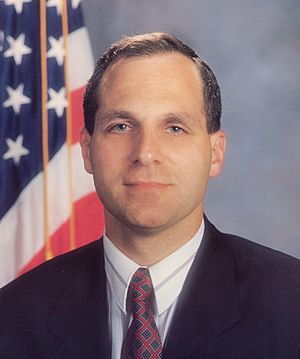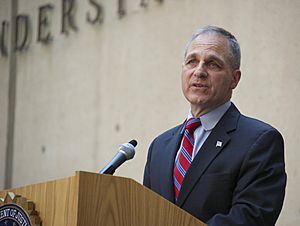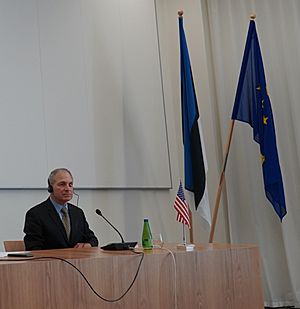Louis Freeh facts for kids
Quick facts for kids
Louis Freeh
|
|
|---|---|
 |
|
| 5th Director of the Federal Bureau of Investigation | |
| In office September 1, 1993 – June 25, 2001 |
|
| President | |
| Deputy |
|
| Preceded by | William S. Sessions |
| Succeeded by | Thomas J. Pickard (acting) |
| Judge of the United States District Court for the Southern District of New York | |
| In office May 30, 1991 – August 31, 1993 |
|
| Appointed by | George H. W. Bush |
| Preceded by | Richard J. Daronco |
| Succeeded by | Shira Scheindlin |
| Personal details | |
| Born |
Louis Joseph Freeh
January 6, 1950 Jersey City, New Jersey, U.S. |
| Political party | Republican |
| Spouse |
Marilyn Coyle
(m. 1983) |
| Children | 6 |
| Education |
|
Louis Joseph Freeh (born January 6, 1950) is an American lawyer and former judge. He is best known for serving as the fifth director of the Federal Bureau of Investigation (FBI) from 1993 to 2001.
Freeh studied at Rutgers University and New York University School of Law. He started his career as a special agent for the FBI. Later, he became a federal prosecutor and a judge. Even though he was a Republican, President Bill Clinton, a Democrat, appointed him to lead the FBI. Today, he works as a lawyer and consultant.
Contents
Early Life and Education
Louis Freeh was born on January 6, 1950, in Jersey City, New Jersey. His mother, Bernice, was a bookkeeper, and his father, William Sr., was a real estate broker. He grew up in North Bergen and went to Saint Joseph of the Palisades High School.
He was a very good student. In 1971, he graduated from Rutgers University–New Brunswick. He then earned a law degree from Rutgers School of Law–Newark in 1974. In 1984, he received a master's degree in criminal law from New York University School of Law. As a young man, Freeh became an Eagle Scout in 1963.
Career Before the FBI
From 1975 to 1981, Freeh worked as an FBI Special Agent in New York City and at the FBI Headquarters in Washington, D.C. In 1981, he became a federal prosecutor in New York. There, he led the Organized Crime Unit and held other important roles. He also served as a first lieutenant in the United States Army Reserve.
Famous Cases as a Prosecutor
One of Freeh's most famous cases was the "Pizza Connection" case in the mid-1980s. He was the main prosecutor in this investigation. The case involved an organized crime group from Sicily that used pizza shops as fronts for illegal activities in the United States. It was a very complex case, and after a long trial, most of the people charged were found guilty.
Freeh was also a special prosecutor in the trial of Walter Moody. Moody was accused of sending mail bombs that killed federal judge Robert Smith Vance and attorney Robert E. Robinson. Moody was found guilty and sentenced to seven life terms in federal prison. He was later executed by the state of Alabama in 2018.
Becoming a Federal Judge
In 1991, President George H. W. Bush nominated Freeh to be a federal judge for the United States District Court for the Southern District of New York. The United States Senate confirmed him, and he served as a judge until 1993. He left this position to become the director of the FBI.
Director of the FBI (1993–2001)
When Louis Freeh became the director, the FBI was dealing with several major incidents. His time as director was marked by many important and challenging investigations.
Major Investigations and Events
Ruby Ridge and Waco
Two major events, the Ruby Ridge standoff in 1992 and the Waco siege in 1993, happened before Freeh became director. However, the investigations into how the FBI handled these events continued during his leadership. These investigations caused tension between Freeh and Attorney General Janet Reno.
Khobar Towers Bombing
In 1996, a truck bomb exploded outside the Khobar Towers military housing complex in Saudi Arabia. The attack killed 19 U.S. military members and a Saudi citizen. Freeh wrote in his book My FBI that he was deeply saddened by this event. The investigation was very difficult. On his last day as director in 2001, a grand jury charged 14 people for the attack.
TWA Flight 800
On July 17, 1996, TWA Flight 800 exploded over the Atlantic Ocean, killing all 230 people on board. The FBI investigated to see if a crime had caused the crash. In 1997, the FBI announced it found no evidence of a criminal act. The National Transportation Safety Board later concluded that the crash was likely caused by an explosion in the center wing fuel tank.
Centennial Olympic Park Bombing
During the 1996 Olympic Games in Atlanta, a bomb exploded in Centennial Olympic Park. A security guard named Richard Jewell was at first considered a person of interest, and his name was leaked to the news. He was later cleared. Freeh testified that he did not know how Jewell's name was leaked.
Unabomber Case
In 1996, the FBI captured Theodore Kaczynski, known as the "Unabomber." He was responsible for a series of bombings over many years. Freeh and Attorney General Reno agreed to publish Kaczynski's writing, called a manifesto, in newspapers. This led to a tip from Kaczynski's brother, who recognized the writing style and helped the FBI find him.
Robert Hanssen Spy Case
In 2001, near the end of Freeh's term, FBI agent Robert Hanssen was arrested. Hanssen had been a spy for the Soviet Union and Russia for over 15 years while working for the FBI. Freeh called the situation "exceptionally grave" and created a special group to study the damage caused by Hanssen's spying.
Resignation from the FBI
Freeh resigned as FBI director in June 2001. Some people felt the FBI needed new leadership after events like the Hanssen spy case. When he left, Attorney General John Ashcroft praised him as "a model law enforcement officer." He was followed by Robert Mueller.
Life After the FBI
After leaving the FBI, Louis Freeh worked for several companies. He joined the board of directors for the credit card company MBNA and the drug company Bristol-Myers Squibb.
In 2007, he started his own consulting and investigation company called Freeh Group International Solutions. The company gives advice to other businesses. He also started a law firm with other former judges and government officials.
Penn State Investigation
In 2011, Pennsylvania State University hired Freeh to lead an investigation into a major scandal at the university. His team included former FBI agents and prosecutors. In 2012, he released a report that was very critical of the university's leaders, including former president Graham Spanier and football coach Joe Paterno.
The report had a big impact on Penn State. The NCAA, which governs college sports, used the report to place heavy sanctions on the university's football program. However, some people, including the Paterno family, disagreed with Freeh's findings. In 2015, the NCAA reversed some of its decisions and restored many of Paterno's wins.
Book and Personal Life
In 2005, Freeh published a book about his career called My FBI: Bringing Down the Mafia, Investigating Bill Clinton, and Fighting the War on Terror.
Freeh married Marilyn Coyle in 1983, and they have six children. He is a devout Roman Catholic. In 2009, he also became a citizen of Italy.
In August 2014, Freeh was seriously injured in a car crash in Vermont. He told police he fell asleep while driving. He was taken to a hospital and later recovered.
See also
- Project Megiddo
 | Jessica Watkins |
 | Robert Henry Lawrence Jr. |
 | Mae Jemison |
 | Sian Proctor |
 | Guion Bluford |



